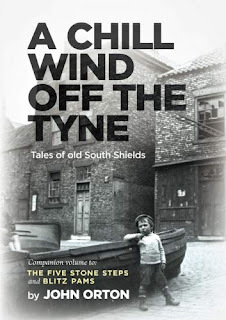Why I Write Historical Fiction - Guest Blogpost from John Orton
John Orton took up writingfollowing his retirement and found a niche for himself in writing about his home-town of South Shields. His Tales ofOld South Shields tell the unofficial history of the town and itscharacters. The first three, set in the earlydecades of the 20th Century, are based on the memoirs of SergeantThomas “Jock” Gordon, of the Shields Police. In his latest book, He Wears a BlueBonnet, John went back in time to the 17th century with aripping yarn set in the salt pans of Auld Sheels.

Young Johnlad used to listen entrancedas his Nan, Gertie, sitting in her usual chair in the kitchen, a cup of tea athand, told stories of her time as a girl in Sheels in the early 1900s:about her Da’, a sailor, John Blot, so called because he could soak it up, whowent on to become a North Sea Pilot; about the monkey who jumped on her headfrom a sailors’ lodging house when she was taking her Da’s dinner to him in apudding basin when he was in dock; about wrecks on the Black Middens and thedangers of crossing the bar; about the time they burned Kruger in the streetsof Shields when Mafeking was relieved; of Dick Burke, the bookie, who wouldescape the polis by going up the backstairs of a house, (you’d hear him comingas his wooden leg knocked on the steps), through the kitchen, ‘G’dafternoon’..’ G’d afternoon Dick’, down the front stairs and away; of the LambtonWorm, with its ‘Geet big teeth, geet big mooth and geet big gogglyeyes.’ The wireless would go on at six o’clock sharp for the latest horseracing results, and Johnlad could remember when she won £13 12s 8d on athre’penny accumulator. He and his brothers got new shoes.
Johnlad never forgot her stories. Heloved comics like the Hotspur, and read books all the time. Againstexpectations he turned out clever, went to Oxford and became a lawyer, reachingthe top of his chosen field in local government as a County Solicitor. But hehad not only taken a love of stories from his Nan, who had neurasthenia as ayoung woman and always suffered with her nerves. Johnlad inherited the gene, hada serious nervous breakdown in his mid-forties and retired from workpermanently. He suffered many years with depression trying to find something worthwhilethat would give him enjoyment and fill his days.
More than forty years after hearinghis Nan’s stories of Old Shields he discovered the memoirs of Station SergeantTom ‘Jock’ Gordon who’d joined the Shields Police from Scotland at the end ofthe First World War. The manuscript, hand written, dog eared and whiskystained, brought vividly to life the characters, good and bad, of a busy coalmining, ship building, industrial port in the 1920s and 1930s where folk tookthe rough with the smooth and got on with it.
Jockhad more tales than Jonlad’s Nan: of one-legged Hughie Ross who’d knocked off anInspector’s helmet with his crutch; of the publicans who left a small pot ofwhisky tied to the back gate of their pub for the Bobby on night shift; of themounted officer whose horse would stop at every pub on the regular route backto the nick, much to the frustration of new riders; of the true story behindthe 1926 race-riots when the Yemeni seamen fought with British sailors for thefew jobs that were going on the ships; of the day the polis raided the pitchand toss gambling dens on Trow rocks. Johnlad also rediscovered Dick Burke,one of many street bookies - Jock Gordon had been in on the raid on Dick’shouse when the Polis confiscated over £800 placed in bets on St Leger Day.
Johlad thought that others should knowabout the old days and decided to write up Jock’s memoirs, together with hisown Nan’s stories. But the tales were short so Johnlad filled in the gaps, and hadto learn for himself how life was lived in those days. So, as well as writing thestories down, Johnlad spent as much time in historical research, to make surehe got things right.
After Johnlad’s books were publishedhe’d hear from Shields folk who’d loved the stories and whose own families had similartales. A woman of Yemeni descent contacted John to tell him that she had wipedaway tears after reading the story of Geordie Hussain in Johnlad’s book, AChill Wind off the Tyne. The same things that happened to him in the 1920swere happening again to people now, she said. Geordie was a foundling, and had been ‘adopted’ by an Arab lodging housekeeper. He had been caught up in the 1926 race riots and was under threat ofdeportation to the Yemen if convicted. He was married to a Shields lass, hadthree children, and had never been to the Yemen in his life –but he had nopapers to prove he was born in Shields. (No spoiler as to how it ends.)
Well, Johnlad thought to himself, ‘Ifmy stories of the past can move someone to tears, then that is why I writehistorical fiction’.

A Chill Wind off the Tyne, byJohn Orton, UKBook Publishing; illustrated edition (9 Aug. 2018) is available onAmazon (paperback and Kindle).
Blog Host Helena P. Schrader is the author of 25 historical fiction and non-fiction books, eleven of which have one one or more awards. You can find out more about her, her books and her awards at: https://helenapschrader.com
Her most recent release, Cold Peace, was runner-up for the Historical Fiction Company BOOK OF THE YEAR 2023 Award, as well as winning awards from Maincrest Media and Readers' Favorites. Find out more at: https://www.helenapschrader.com/cold-peace.html




